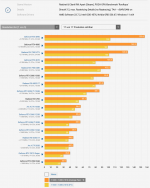- Joined
- Apr 23, 2019
- Messages
- 832
- Points
- 93
Introduction Let’s say you purchased a $399 MSRP GeForce RTX 2060 SUPER in 2019, and you want to purchase a new upgrade in 2023 for around the same MSRP. That new upgrade would be the $399 MSRP GeForce RTX 4060 Ti 8GB in 2023. You are probably asking yourself, what kind of a performance upgrade are you actually going to get after four years if you upgrade straight from a GeForce RTX 2060 SUPER to the new GeForce RTX 4060 Ti? In this performance comparison review today, we are going to directly review the GeForce RTX 2060 SUPER versus GeForce […]
See full article...
See full article...

